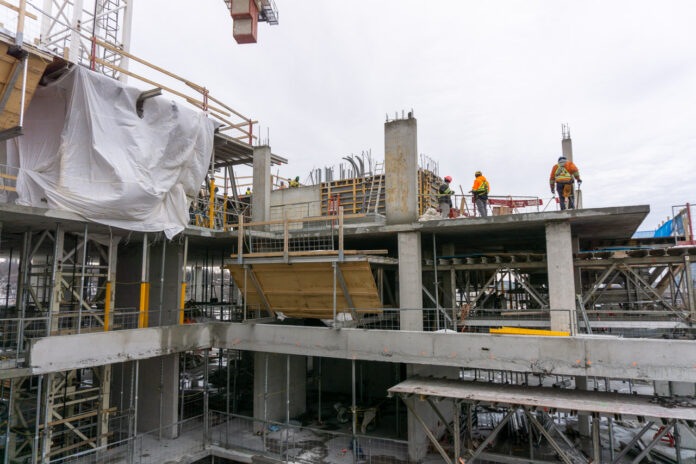Torontonians understand better than most that the economy’s current fragility has trickling effects. Put simply, when money gets tight, services suffer and over the past few months in this city we’ve seen first hand what that means; The reduced frequency of TTC, schools cutting programs and selling land, health care backlogs and poor infrastructure are some of the most relevant examples.
To combat these negative trends, governments collect taxes as one of their most important sources of revenue, but what happens when one of the country’s biggest industries uses loopholes to avoid taxes entirely? Tax fraud and tax evasion are so rampant in the construction industry that the impact is being felt across the country, and the trend is not new.
Looking east at Toronto’s downtown core skyline, image by UT Forum contributor ADRM
The leading watchdog documenting this crisis is the United Brotherhood of Carpenters & Joiners of America (UBC), one of North America’s largest construction unions, representing over half a million members. Each April, UBC seeks to raise awareness of tax fraud in the construction industry through a campaign called Tax Fraud Days of Action. This year’s campaign ran from April 12-18, and on the Canadian front, the group lobbied local, provincial and federal governments to take action and address this issue before it gets worse.
UBC officials meet with Prime Minister Justin Trudeau, image courtesy of UBCJA
UBC goes into the details of why tax fraud is an issue of national concern and provides a number of metrics that underscore the seriousness of the problem and how widespread it is, particularly in the construction industry. Starting with the bottom line, the Ontario Building Secretariat has reported that the federal government is losing $3.1 billion in tax revenue due to tax fraud related to the construction industry. That total includes an estimated $1.1 billion in income taxes, $823 million in HST and $654 million in CPP contributions.
Construction as an industry is vulnerable to this problem for a number of reasons related to the informal economy, a term that refers to areas of the economy that are not monitored or taxed by government. At the macro level, construction companies of various sizes are having success avoiding taxes by hiring workers as independent contractors, rather than formally hiring them on the payroll and paying them under the table. At the micro level, small home improvement projects where homeowners pay workers cash have the same effect, although workers’ income is generally undeclared.
The consequences are threefold. For one, workers employed in this capacity lose their benefits and are not protected and would cover all medical expenses in the event of an accident. Second, contractors who formally employ their workers and pay taxes are gradually losing the ability to provide services at competitive costs compared to fraudulent contractors, further hurting the industry. Finally, tax shortfalls affect the federal budget and can have a direct impact on the funding of health care and infrastructure.
Tax fraud is most common when workers are employed as independent contractors, image by Matias Bessai
To combat this problem, this year’s UBC Tax Fraud Days focused on advancing multiple goals. In the short term, the organization pushed to be included on the CRA’s Underground Economy Advisory Committee, which gave it closer involvement in the federal response to tax fraud. UBC also pushed for longer-term reforms, including the implementation of a “fair wage” policy that would ban doing business with contractors who discriminate against their workers, and a study into the feasibility of new legislation that could impose greater liability for tax fraud.
While change doesn’t happen overnight, UBC recognizes that it begins with awareness. The organization will return with Tax Fraud Days next year and will continue to monitor the problem and its impact as the various levels of government formulate their strategies.
* * *
UrbanToronto has a research service, UrbanToronto Pro, that provides comprehensive data on metro Toronto development projects from concept to completion. We also offer instant reports, downloadable snapshots based on location, and a daily subscription newsletter, New Development Insider, that follows projects from the first application.

















